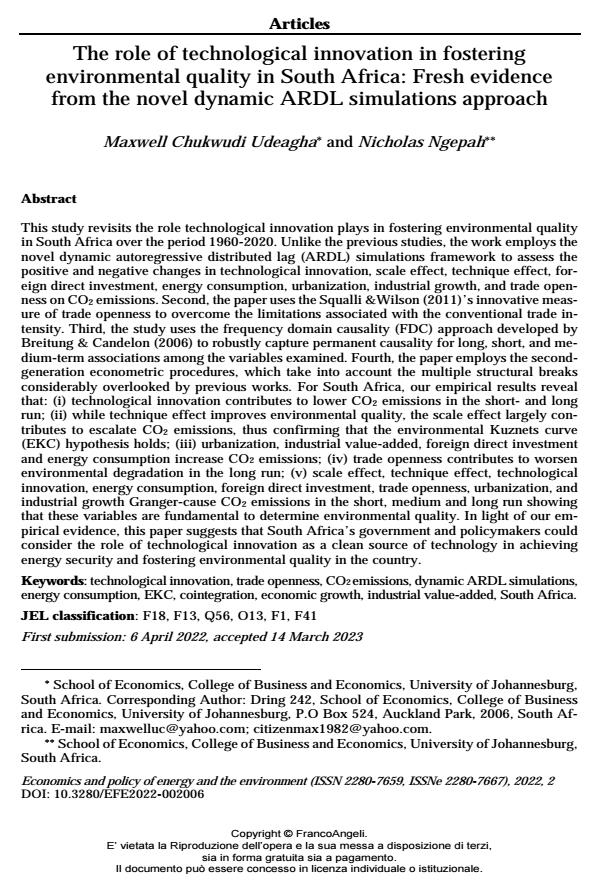The role of technological innovation in fostering environmental quality in South Africa: Fresh evidence from the novel dynamic ARDL simulations approach
Titolo Rivista ECONOMICS AND POLICY OF ENERGY AND THE ENVIRONMENT
Autori/Curatori Maxwell Chukwudi Udeagha, Nicholas Ngepah
Anno di pubblicazione 2023 Fascicolo 2022/2
Lingua Inglese Numero pagine 49 P. 107-155 Dimensione file 509 KB
DOI 10.3280/EFE2022-002006
Il DOI è il codice a barre della proprietà intellettuale: per saperne di più
clicca qui
Qui sotto puoi vedere in anteprima la prima pagina di questo articolo.
Se questo articolo ti interessa, lo puoi acquistare (e scaricare in formato pdf) seguendo le facili indicazioni per acquistare il download credit. Acquista Download Credits per scaricare questo Articolo in formato PDF

FrancoAngeli è membro della Publishers International Linking Association, Inc (PILA), associazione indipendente e non profit per facilitare (attraverso i servizi tecnologici implementati da CrossRef.org) l’accesso degli studiosi ai contenuti digitali nelle pubblicazioni professionali e scientifiche.
This study revisits the role technological innovation plays in fostering environmental quality in South Africa over the period 1960-2020. Unlike the previous studies, the work employs the novel dynamic autoregressive distributed lag (ARDL) simulations framework to assess the positive and negative changes in technological innovation, scale effect, technique effect, for- eign direct investment, energy consumption, urbanization, industrial growth, and trade open- ness on CO2 emissions. Second, the paper uses the Squalli &Wilson (2011)’s innovative meas- ure of trade openness to overcome the limitations associated with the conventional trade in- tensity. Third, the study uses the frequency domain causality (FDC) approach developed by Breitung & Candelon (2006) to robustly capture permanent causality for long, short, and me- dium-term associations among the variables examined. Fourth, the paper employs the second- generation econometric procedures, which take into account the multiple structural breaks considerably overlooked by previous works. For South Africa, our empirical results reveal that: (i) technological innovation contributes to lower CO2 emissions in the short- and long run; (ii) while technique effect improves environmental quality, the scale effect largely con- tributes to escalate CO2 emissions, thus confirming that the environmental Kuznets curve (EKC) hypothesis holds; (iii) urbanization, industrial value-added, foreign direct investment and energy consumption increase CO2 emissions; (iv) trade openness contributes to worsen environmental degradation in the long run; (v) scale effect, technique effect, technological innovation, energy consumption, foreign direct investment, trade openness, urbanization, and industrial growth Granger-cause CO2 emissions in the short, medium and long run showing that these variables are fundamental to determine environmental quality. In light of our em- pirical evidence, this paper suggests that South Africa’s government and policymakers could consider the role of technological innovation as a clean source of technology in achieving energy security and fostering environmental quality in the country.
Parole chiave:technological innovation, trade openness, CO2 emissions, dynamic ARDL simulations, energy consumption, EKC, cointegration, economic growth, industrial value-added, South Africa
Jel codes:F18, F13, Q56, O13, F1, F41
- A roadmap to a green economy in South Africa: modelling technological innovation and energy consumption in the novel dynamic ARDL simulations framework Maxwell Chukwudi Udeagha, Nicholas Ngepah, in Cogent Economics & Finance 2295191/2024
DOI: 10.1080/23322039.2023.2295191 - The impact of green finance on sustainable development: an investigation into national ESG performance Mingbo Zheng, Limin Wu, Gen-Fu Feng, Chun-Ping Chang, in Journal of Applied Economics 2528672/2025
DOI: 10.1080/15140326.2025.2528672 - The drivers of environmental sustainability in BRICS economies: Do green finance and fintech matter? Maxwell Chukwudi Udeagha, Nicholas Ngepah, in World Development Sustainability 100096/2023 pp.100096
DOI: 10.1016/j.wds.2023.100096 - Tariff effects on industrial performance: symmetric and asymmetric evidence from Nigeria Richard O. Ojike, Marius Ikpe, Joseph Chukwudi Odionye, Sunday V. Agu, in African Journal of Economic and Management Studies /2025 pp.167
DOI: 10.1108/AJEMS-09-2023-0366 - The Role of Fiscal Decentralization in Limiting CO2 Emissions in South Africa Maxwell Chukwudi Udeagha, Marthinus Christoffel Breitenbach, in Biophysical Economics and Sustainability 5/2023
DOI: 10.1007/s41247-023-00112-w
Maxwell Chukwudi Udeagha, Nicholas Ngepah, The role of technological innovation in fostering environmental quality in South Africa: Fresh evidence from the novel dynamic ARDL simulations approach in "ECONOMICS AND POLICY OF ENERGY AND THE ENVIRONMENT" 2/2022, pp 107-155, DOI: 10.3280/EFE2022-002006